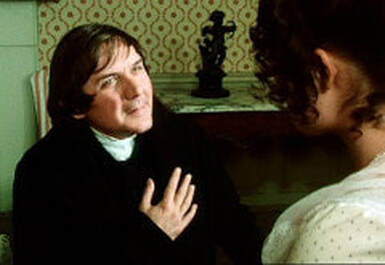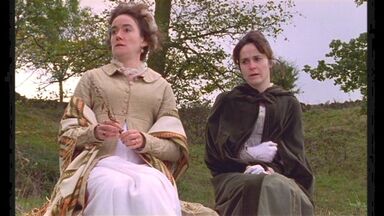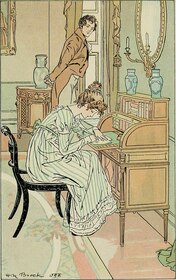| Clutching My Pearls is my ongoing blog series about my take on Jane Austen’s beliefs and ideas, as based on her novels. Click here for the first in the series. |

Austen is taking a revolutionary approach in Pride and Prejudice, but we are looking in the wrong place if we are looking at the French Revolution. The revolution is a more personal one. Elizabeth turns down two offers of marriage, one of them extremely eligible, because she does not like and respect the men who make them (although of course she changes her mind about one of them). As Green points out, Austen was writing "at a time when individual happiness was not privileged over family status and security." When Elizabeth turns down Mr. Collins it appears she has condemned her family to a life of poverty when their father dies. She has a chance to keep Longbourn in the family and she's thrown it away. This could be an extremely dramatic moment in any other novel but Austen treats the subsequent discussion with her mother and father with humour. Elizabeth is true to herself. She is even prepared to pay a very high price for refusing to marry someone she can't respect. She is rewarded in the end...
This stress on the rights and liberty of the individual arises from Enlightenment values. Consider Thomas Jefferson: "We hold these truths to be self-evident, that all men are created equal, that they are endowed by their Creator with certain unalienable Rights, that among these are Life, Liberty and the pursuit of Happiness." As Elizabeth defiantly tells Lady Catherine de Bourgh, "I am only resolved to act in that manner, which will, in my own opinion, constitute my happiness, without reference to you, or to any person so wholly unconnected with me.”
Rank and social class are integral to Austen's novels. Persuasion and Pride & Prejudice both mention "rank" 12 times. On the one hand, Austen is critical of Mary Musgrove for tenaciously insisting that her rank as a baronet's daughter be recognized, that she walk into the dining room ahead of her own mother-in-law.
| [I]t was Mary's complaint, that Mrs Musgrove was very apt not to give her the precedence that was her due, when they dined at the Great House with other families; and she did not see any reason why she was to be considered so much at home as to lose her place. And one day when Anne was walking with only the Musgroves, one of them after talking of rank, people of rank, and jealousy of rank, said, "I have no scruple of observing to you, how nonsensical some persons are about their place, because all the world knows how easy and indifferent you are about it; but I wish anybody could give Mary a hint that it would be a great deal better if she were not so very tenacious... it is not that mamma cares about it the least in the world, but I know it is taken notice of by many persons." |
 Mary Musgrove refuses to visit her husband's low relations
Mary Musgrove refuses to visit her husband's low relations There are limits to the egalitarianism, however: Anne Elliot may be "easy and indifferent" about rank, but she doesn't want Mrs. Clay to marry her father. How dare Mrs. Clay act in that manner which will constitute her happiness, without reference to Anne, or to any person so wholly unconnected with her?
In Sense and Sensibility, Lady Middleton, Mrs. Jenning's daughter, regrets that her mother hasn't dropped her old city friends (the wives of vulgar merchants or bankers). Well, she's a snob, but the heroines Elinor and Marianne are also made uncomfortable by the acquaintance. "[E]xcepting a few old city friends... [Mrs. Jennings] visited no one to whom an introduction could at all discompose the feelings of her young companions."
Lucy Steele, Mrs. Elton and Isabella Thorpe are objectionable characters in part because they are underbred. Emma is a snob, yet I do not think we are asked to disagree with Mr. Knightley's opinion that Harriet Smith is of a lower social class and not an appropriate confidante for Emma. Fortunately Harriet ends up "happy and respectable in the line of life to which she ought to belong."
It's not as though differences in social class have disappeared today. High-ranking politicians don't marry chambermaids, except in the movies, and when they do the chambermaid swiftly becomes an entrepreneur.
 Fanny Price doesn't respect Henry Crawford
Fanny Price doesn't respect Henry Crawford In Mansfield Park, her most serious novel, Austen's heroine Fanny Price hopes her uncle will forgive her for rejecting Henry Crawford's proposal of marriage, and come to feel, "as a good man must feel, how wretched, and how unpardonable, how hopeless, and how wicked it was to marry without affection."
And there is that rare, fleeting, tender moment in Pride & Prejudice when Mr. Bennet speaks seriously to Lizzie: "My child, let me not have the grief of seeing you unable to respect your partner in life."
Marrying without affection or respect is actually wicked, or in other words, sinful. And marrying without being able to support yourself and your family is also wrong.
Next post: If you can't afford to marry.
| I take a slightly more sympathetic view of Mrs. Clay in my short story, "The Art of Pleasing," which appears in the Quill Ink anthology Rational Creatures. Click here for info about my Mansfield Trilogy. Update: I revisit the topic of rank and class in this series of blog posts. |

 RSS Feed
RSS Feed